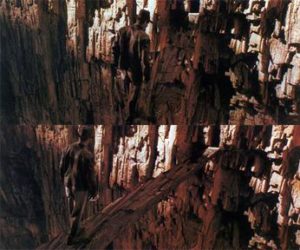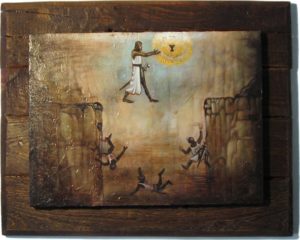Man defines Faith as a Leap into the Unknown
Often Though the Use of Material Props
In the movie, Indiana Jones and The Last Crusade, there were three tests to complete to reach the cup of Christ. Each of these illustrate a popular though mistaken view of biblical doctrine. One of the most mistaken views concerns faith as a leap into the unknowable. Thus, if one’s faith is strong enough one will survive this leap as God will not let one fail as illustrated in the above graphic from the movie. How is your faith?
In truth, the idea of faith as a leap into the unknown illustrating complete trust in God is never found in the Bible. This is a fabrication stitched together by Lucifer enticing people to test God to prove their worthiness for salvation. Christ’s answer is sufficient to debunk this erroneous line of fantasy (Mt 4:5-7). Lucifer sought to test Christ, and God, by asking Christ to “throw Himself down” so God, via His angels, would catch Him. Such an action would simply make God a slave to the whim of everyone who wanted to demonstrate control over God. Obviously, this line of reasoning was the result of poor theology developed over the centuries first by Catholicism and later by Protestantism that refused to throw off all the errors learned from Catholicism. Yet, the movie did illustrate the truth of faith even if unintentionally.

In this graphic from the movie the top
frame appears to not show a bridge
But, the bottom frame shows a bridge
The Bible never asserts that faith is apart from reality. As the above graphic illustrates, the elements of faith are not apparent to the lost individuals. They are not taught by the Holy Spirit for the elements of truth of God are foolishness to them (1Co 2:14). From their worldview perspective a person of faith appears to be leaping from the known into the unknown. If this were true then God would never have provided the Bible. He would have just demanded people to leap and if they really, really, really trusted God then He would save them, answer their prayers or do whatever they expected for Him. Yet, this perspective puts man in control of God. How could God have any plan for mankind if the millions of millions of people were arbitrarily in control of God? Instead, the bottom of the graphic yields the truth of faith. There is substance on which to step, a basis for one’s beliefs and therefore of one’s actions. Can we find such a definition in the Bible; after all, we claim to be people of the Bible and all such basis of doctrinal theology must therefore be in the Bible. There is just such a definition though it is not well understood.
Now faith is the substance of things hoped for, the evidence of things not seen (He 11:1). To truly understand this statement we will have to look behind the vernacular language. We will need to look at the original Greek as it was defined and used by the writer in the historical, cultural context of his day, not of yours. The word translated as substance is the Greek word, hypostasis (ὑπόστασις). This word was used to denote the foundation reality of the subject under discussion. In this instance the writer, God, says that there is a foundational basis for the hope of His salvation. This is not a “think so” or a “hope so” nor even a “believe so” ephemeral hope of God supporting us. This is a concrete reality that becomes the evidence (ἔλεγχος) or proof of that which cannot be seen. The writer goes on to say that all that is visible (empirical) is based on the invisible (nonempirical). Thus, the primary forces of the universe which control that which we can see are invisible to us. Is this true?
In the early days of the Enlightenment Period man sought to unburden himself from the logical fallacy, appeal to authority (scholasticism). Descartes, Father of Modern Philosophy, reasoned that since he could reason he must be unique and made by a higher power, God {though not the God of the Bible}. This made man the measure of all things and began the search for absolute truth. In his day Descartes would have been considered a naturalist philosopher {it was not until the mid 19th century that science and philosophy separated into two different branches of knowledge}. It soon became apparent that man, using empirical methodologies, could not discover absolute truth; man could only discover relative truth. There were underlying realities that were beyond the ability of man to discover as absolutes. For instance, man can discern gravity but man cannot define the nature of gravity. Man can channel electricity but an actual definition and complete understanding of electricity eludes empirical man. Thus, man could measure the effects of the invisible but he could not even define the basis of these invisible forces. Man was proving the truth of the Bible even as he was rejecting the Bible as a source of true morality. In effect, man was violating the Law of Non-Contradiction. Man was denying the truth of the Bible while confirming the truth of the Bible! The solution? Separate natural philosophy into two branches. Philosophy will continue to disprove God and the need for God to define morality. Science will continue to make empirical discoveries giving man the power to demonstrate he does not need God. Ergo, man is god!

Faith is built on God’s Word
Man’s faith is empowered by the Spirit
The more man proves he is master of creation the more he demonstrates his powerlessness. The reason man cannot predict the weather is because there are spiritual forces at work beyond his empirical means to detect. The more man seeks to demonstrate his mastery the more he demonstrates his powerlessness. This physical empirical creation is built on invisible forces which God controls. Instead, man continues to speak as ancient man by eluding to this physical creation as Nature. Nature becomes personified as a separate entity needing to be understood and controlled by man; however, this is simply substituting a logical fallacy rather than acknowledging the truth (Anthropomorphism).
The more man applies his philosophical knowledge (scientism) to societies, the more violent they become. Man’s answer is to continue the same application of scientism and anti-biblical philosophy which results in even greater levels of violence. Man proves the truth of the Bible while denying its truths (Ro 1:18-32). Man seeks to legitimize the effects of sin while trying to control the more violent, self-destructive behaviors of sin; this is the function of government. Yet, the more control government seeks to exercise over citizens, the more violent those citizens become denoting the truth of the Bible and the failure of both governments and people comprising those governments and societies. This resulted in one cataclysm {Flood} and will result in another ushering in the return of Christ.
Governments and their societies must suppress those who live by true faith taught in the Bible. These people, by the very nature of their beliefs and lives, disprove the basis of sinful society. Paradoxically, it is not the Christian who lives by a leap of faith into the unknown; all that can be known of God is found in the Bible. It is the lost world which blindly leaps into the unknown hoping that their humanistic secular philosophies and scientisms will bring them the peace they claim to so earnestly desire. Yet, in the end it will be these people who will beg the mountains to fall on them hiding them from the face of God, the only One who could save them (Re 6:14-17). Unfortunately, many who call themselves Christians defect from the true faith to embrace this leap into the unknown becoming shipwrecked in their faith; forever lost and proving that they were never of Christ, children of the Bible.

